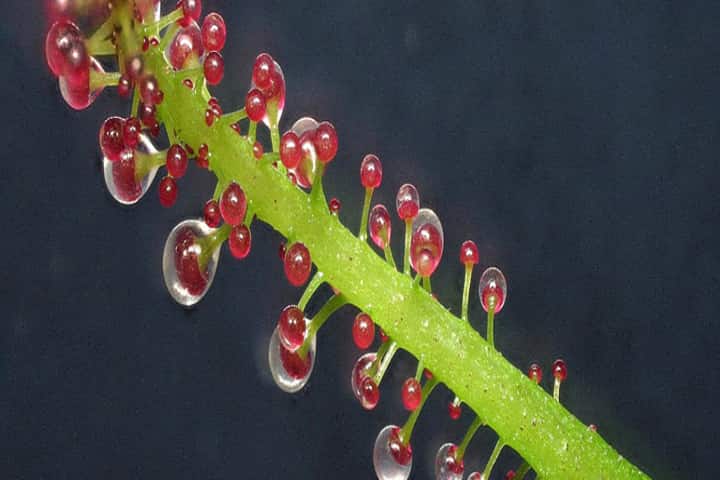

Triphyophyllum peltatum the plant that turns carnivorous as per its need (Pic. Courtesy sciencealert.com)
While most of us think that plants don’t eat other organisms there are certain exceptions which do have a taste for meat. Yet, there is one remarkable plant that is carnivorous on a part-time basis as per a sciencealert.com report.
It is a rare plant that is found in West Africa’s Sierra Leone. Called Triphyophyllum peltatum it grows in the tropical forests and snares insects but not on a regular basis. Scientists were intrigued but were unable to get to the bottom of it as growing it is extremely difficult.
While making efforts to grow it, the scientists from Leibniz University Hannover and the University of Wurzburg in Germany discovered certain peculiar traits of this plant. Interestingly, it was studied in detail because it has chemicals that can help in the development of drugs to fight malaria and certain types of cancer.
During its early life, T. peltatum uses photosynthesis to make food and on reaching maturity it develops leaves with two hooks at the tip to help it reach out to the sun. It is at this stage that some plants sprout glandular leaves which discharge big globules of liquid which is blood coloured and sticky and more importantly capable of catching unaware beetles for its meal.
Now the twist in the tale, some of these plants that turn carnivorous suddenly drop their taste for meat. Thus, meat eating is not permanently ingrained in T. peltatum unlike other carnivorous plants like sundews, bladderworts, butterworts and Venus flytrap. In fact, some of these plants never turn meat-eaters at all.
The researchers felt that the plants turn carnivores to make good some nutrient/s that they were deprived of.
To understand this quirky behaviour scientists first grew this plant at the botanical gardens of Wurzburg in a lab in Hannover. In small plastic vessels, 60 shoots were grown in soil that lacked either potassium, phosphorus or nitrogen. Constant vigil was maintained to observe if they had become meat-eaters.
Finally, the ones which grew in the soil that did not have phosphorus grew the glandular leaves that were red in hue. More plants were grown in glasshouses in soil with low levels of phosphorus.
A vital mineral, phosphorus is critical for the development and growth of the plant and necessary for the core components of its DNA and membranes. With the help of an extensive network of roots, the plants obtain phosphorus from the soil yet when they face a situation of starvation, the T. peltatum turns to insect-catching.
Since turning carnivorous is an energy intensive exercise requiring production of sticky glue and enzymes to digest animal matter, once enough phosphorus is acquired, the plant switches to photosynthesis method.
Summing up the findings, the researchers in their paper that was published in New Phytologist wrote: “When the [phosphorous] concentration drops below a critical threshold, T. peltatum invests in the formation of carnivorous leaves to be able to complement their phosphorous stocks from captured animals. After soil phosphorus content recovers to pre-stress levels, ‘cheaper’ photosynthesis leaves get produced.”
Union Minister for Communications Jyotiraditya Scindia chaired a key meeting with the Bharat 6G Alliance…
Japanese Ambassador in Kabul, Takayoshi Kuromaya, has called on the Taliban government in Afghanistan to…
The Digital India Foundation (DIF), a founding member of the AI Alliance Network (AIANET), has…
Current bullion market is focusing on a combination of factors which includes direction of US…
National Security Advisor Ajit Doval on Friday slammed foreign media for their reportage of Operation…
The Bharat Utsav, a festival celebrating India's rich culture, heritage, and tradition, has begun in…